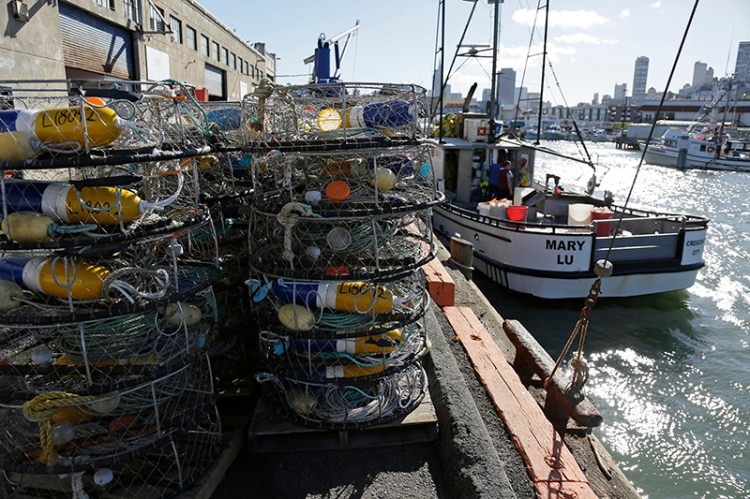Fishermen are still waiting for permission to catch Dungeness crabs off California’s northernmost coast this season — and they want oil companies to pay for the delay.
State officials have postponed the start of the commercial Dungeness crab season because of high levels of a neurotoxin called domoic acid. Similar closures have wreaked economic havoc on the industry in recent years.
The neurotoxin’s presence in the prized crabs has been linked to warming ocean waters, one of the many effects of human-caused climate change. That’s why the West Coast’s largest organization of commercial fishermen is suing more than a dozen oil companies, arguing they have knowingly peddled a product that threatens ocean life and the people whose economic fortunes depend on it.
The oil companies “engaged in a coordinated, multi-front effort to conceal and deny their own knowledge of those threats, discredit the growing body of publicly available scientific evidence, and persistently create doubt,” the Pacific Coast Federation of Fishermen’s Assns. said in its lawsuit, filed last month.
“Families and businesses that depend on the health and productivity of the Dungeness crab fishery to earn their livings suffer the consequences,” the federation said.
How Exxon went from leader to skeptic on climate change research ”
The fishermen’s group joins cities from California to New York that have sued the fossil fuel industry over its role in causing climate change. The lawsuits have been compared to legal actions brought against the tobacco industry in the 1990s, seeking damages to treat lung cancer and other health consequences of smoking.
The legal issues are similar in the fishermen’s case, but what makes their lawsuit unique is that it pits one industry against another, said Ann Carlson, co-director of the Emmett Institute on Climate Change and the Environment at UCLA. Carlson said it’s possible the courts will be more sympathetic to the fishermen.
“It’s really interesting to have a group of plaintiffs alleging specific economic harm to their livelihoods. I think it’s compelling in a lot of ways,” she said. “It’s true the governments are alleging they’re being harmed financially by climate change, but it’s a little more nebulous than having fishermen who have been harmed.”
Sean Comey, a spokesperson for Chevron, one of the oil companies named in the fishermen’s lawsuit, said the case is “without merit and counterproductive to real solutions to climate change.”
“The lawsuit seeks to penalize the production of reliable, affordable energy, which has been lawful and encouraged by governments. Energy companies and their products are vital to the global economy,” Comey said in an email.
Representatives for ExxonMobil and BP, which were also named in the lawsuit, didn’t immediately respond to requests for comment.
Small-scale fishermen in Northern and Central California rely heavily on Dungeness crabs, said Noah Oppenheim, the federation’s executive director. He said the crabs can generate more than $250 million in annual revenue for fishermen and coastal communities in California alone.
“It’s one of the most lucrative fisheries in the region,” he said. “Our communities on the north coast are generally rural and highly dependent on this economic sector.”
But climate change has been making the Dungeness fishery less lucrative lately.
Most of the extra heat trapped in the Earth’s atmosphere by rising levels of carbon dioxide is absorbed by the planet’s oceans. Off the coasts of California and Oregon, that extra heat has helped fuel algal blooms, which in turn have led to dangerous concentrations of domoic acid in areas normally scoured by crab fishermen.
According to Oppenheim, there had never been a domoic acid closure in the history of California’s Dungeness crab fishery until 2015. But that fall, state officials delayed the start of the season by several months off parts of the California coast.
This year, some crabbing areas are being opened this Saturday after a delay. Waters off the state’s northernmost coast are still closed through at least Dec. 16 because of domoic acid.
Oppeneheim said fishermen are being forced to consider costly adaptation strategies as the threat from global warming continues to grow. He said the oil industry is directly responsible for some of those costs.
“We genuinely feel that the industry that caused this economic harm needs to be held to account,” he said.
California crabbing is far from the only commercial fishing industry facing climate-related harm. The Fourth National Climate Assessment, released by the federal government last month, cited the effects of warming waters on fisheries across the country, from cod in the Gulf of Maine to shrimp in the Gulf of Mexico.
Send questions/comments to the editors.



Success. Please wait for the page to reload. If the page does not reload within 5 seconds, please refresh the page.
Enter your email and password to access comments.
Hi, to comment on stories you must . This profile is in addition to your subscription and website login.
Already have a commenting profile? .
Invalid username/password.
Please check your email to confirm and complete your registration.
Only subscribers are eligible to post comments. Please subscribe or login first for digital access. Here’s why.
Use the form below to reset your password. When you've submitted your account email, we will send an email with a reset code.